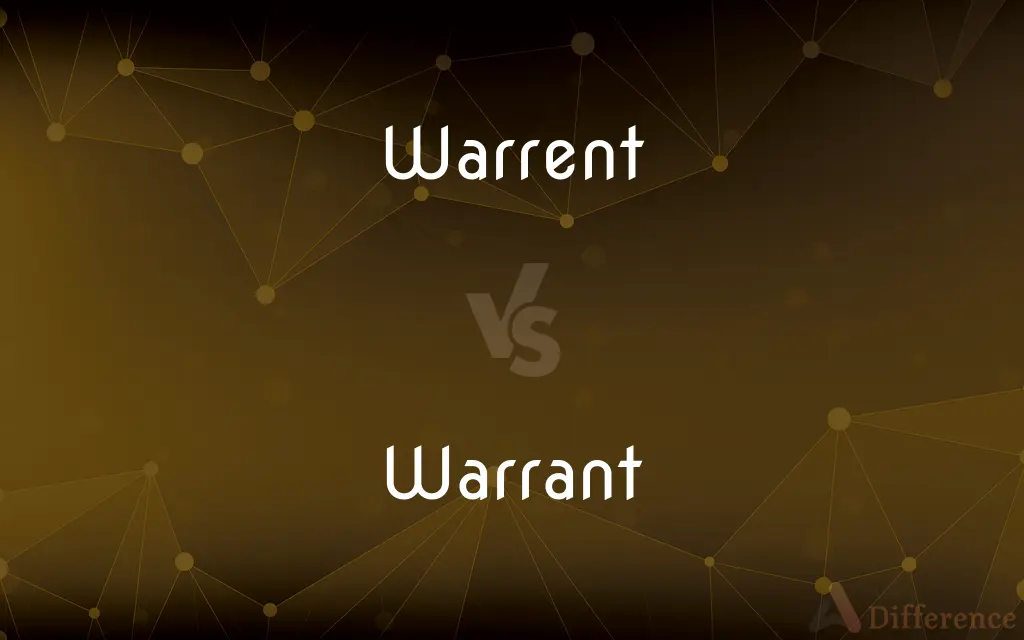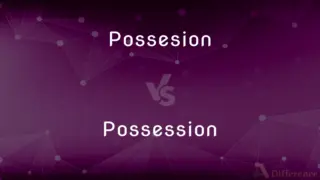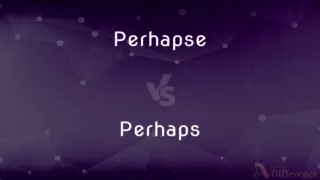Warrent vs. Warrant — Which is Correct Spelling?
Edited by Tayyaba Rehman — By Fiza Rafique — Updated on April 1, 2024
"Warrent" is an incorrect spelling. The correct spelling is "Warrant," referring to a document giving authority or justification.

Table of Contents
Which is correct: Warrent or Warrant
How to spell Warrant?

Warrent
Incorrect Spelling

Warrant
Correct Spelling
ADVERTISEMENT
Key Differences
"Warrant" has two R's just like "guarantee."
Warranties come with a "warrant" but not a "warrent."
Think of "war" + "rant" – both strong, authoritative terms.
"Warrant" rhymes with "current," both spelled with a single "e."
A warrant is valid; a "warrent" isn't valid because it's misspelled.
ADVERTISEMENT
How Do You Spell Warrant Correctly?
Incorrect: The judge issued a warrent for his arrest.
Correct: The judge issued a warrant for his arrest.
Incorrect: He asked if they had a warrent to confiscate his belongings.
Correct: He asked if they had a warrant to confiscate his belongings.
Incorrect: She believed she had a warrent to search the premises.
Correct: She believed she had a warrant to search the premises.
Incorrect: The police could not act without a valid warrent.
Correct: The police could not act without a valid warrant.
Incorrect: Their actions were not supported by any legal warrent.
Correct: Their actions were not supported by any legal warrant.
Warrant Definitions
A legal document authorizing certain actions.
The police obtained a warrant to search the house.
To justify or necessitate (a particular action).
His behavior warrants further investigation.
To guarantee the quality of something.
The manufacturer warrants the product against defects.
A financial instrument giving holder rights.
Stock warrants provide options to purchase stock at a specific price.
(Law) A judicial writ authorizing the search or seizure of property, arrest of a person, or the execution of a legal judgment.
A voucher authorizing payment or receipt of money.
An option to buy stock at a specified price from an issuing company.
Justification for an action or a belief; grounds
"The difficulty of predicting the future is no warrant to ignore it" (Brian Hayes).
Something that provides assurance or confirmation; a guarantee or proof
"The kind of uncertainties and ambiguities ... which may damage [his] essays ... are often a warrant of authenticity in [his] fiction" (John Edward Hardy).
Authorization or certification; sanction, as given by a superior.
A warrant officer.
A certificate of appointment given to a warrant officer.
To provide adequate grounds for; justify or require
What could he have done that would warrant such a punishment?.
To guarantee (a product).
To guarantee (a purchaser) indemnification against damage or loss.
(Law) To guarantee clear title to (real property).
Authorization or certification; a sanction, as given by a superior.
(countable) Something that provides assurance or confirmation; a guarantee or proof.
A warrant of authenticity; a warrant for success
(countable) An order that serves as authorization; especially a voucher authorizing payment or receipt of money.
An option, usually issued together with another security and with a term at issue greater than a year, to buy other securities of the issuer.
A judicial writ authorizing an officer to make a search, seizure, or arrest, or to execute a judgment.
An arrest warrant issued by the court
(countable) A certificate of appointment given to a warrant officer.
A document certifying that a motor vehicle meets certain standards of mechanical soundness and safety; a warrant of fitness.
A defender, a protector.
Underclay in a coal mine.
Warren earth
To protect, keep safe (from danger).
To give (someone) an assurance or guarantee (of something); also, with a double object: to guarantee (someone something).
(transitive) To guarantee (something) to be (of a specified quality, value, etc.).
(transitive) To guarantee as being true; (colloquially) to believe strongly.
That tree is going to fall, I’ll warrant.
(transitive) To authorize; to give (someone) sanction or warrant (to do something).
I am warranted to search these premises fully.
(transitive) To justify; to give grounds for.
Circumstances arose that warranted the use of lethal force.
That which warrants or authorizes; a commission giving authority, or justifying the doing of anything; an act, instrument, or obligation, by which one person authorizes another to do something which he has not otherwise a right to do; an act or instrument investing one with a right or authority, and thus securing him from loss or damage; commission; authority.
A writing which authorizes a person to receive money or other thing.
That which vouches or insures for anything; guaranty; security.
I give thee warrant of thy place.
His worth is warrant for his welcome hither.
A precept issued by a magistrate authorizing an officer to make an arrest, a seizure, or a search, or do other acts incident to the administration of justice.
That which attests or proves; a voucher.
An official certificate of appointment issued to an officer of lower rank than a commissioned officer. See Warrant officer, below.
Right; legality; allowance.
To make secure; to give assurance against harm; to guarantee safety to; to give authority or power to do, or forbear to do, anything by which the person authorized is secured, or saved harmless, from any loss or damage by his action.
That show I first my body to warrant.
I'll warrant him from drowning.
In a placeLess warranted than this, or less secure,I can not be.
To support by authority or proof; to justify; to maintain; to sanction; as, reason warrants it.
True fortitude is seen in great exploits,That justice warrants, and that wisdom guides.
How little while it is since he went forth out of his study, - chewing a Hebrew text of Scripture in his mouth, I warrant.
To give a warrant or warranty to; to assure as if by giving a warrant to.
[My neck is] as smooth as silk, I warrant ye.
To secure to, as a grantee, an estate granted; to assure.
A writ from a court commanding police to perform specified acts
A type of security issued by a corporation (usually together with a bond or preferred stock) that gives the holder the right to purchase a certain amount of common stock at a stated price;
As a sweetener they offered warrants along with the fixed-income securities
Formal and explicit approval;
A Democrat usually gets the union's endorsement
A written assurance that some product or service will be provided or will meet certain specifications
Show to be reasonable or provide adequate ground for;
The emergency does not warrant all of us buying guns
The end justifies the means
Stand behind and guarantee the quality, accuracy, or condition of;
The dealer warrants all the cars he sells
I warrant this information
A written assurance about product quality.
The product comes with a one-year warranty.
Warrant Meaning in a Sentence
Without a warrant, the search would be illegal.
A search warrant allows police to enter and search premises.
The judge can issue a warrant based on probable cause.
Warrant officers in the military hold a special rank.
The court warrant was necessary for the wiretap.
The situation doesn't warrant such extreme measures.
A bench warrant is issued when someone fails to appear in court.
His behavior didn't warrant the severe punishment he received.
He was arrested after the police obtained a warrant for his arrest.
The officer presented a warrant before entering the home.
Obtaining a warrant can sometimes be a lengthy process.
Environmental protection laws warrant careful consideration.
A no-knock warrant allows officers to enter without announcing themselves.
Before executing the warrant, officers must verify its validity.
The evidence was enough to warrant an investigation.
Common Curiosities
Which preposition is used with Warrant?
"for" (as in, warrant for arrest).
Which conjunction is used with Warrant?
No specific conjunction is tied exclusively to "warrant."
What is the verb form of Warrant?
Warrant (e.g., This warrants attention).
Which vowel is used before Warrant?
The vowel "a."
Why is it called Warrant?
Derived from Old North French "warant," it signifies a protection or defense.
Is Warrant an abstract noun?
No, it's a concrete noun as it can be a tangible document.
Is Warrant a negative or positive word?
Neutral; its connotation depends on context.
What is the pronunciation of Warrant?
/ˈwɔr.ənt/.
What is the root word of Warrant?
The Old North French word "warant."
What is the singular form of Warrant?
Warrant.
What is the plural form of Warrant?
Warrants.
Which article is used with Warrant?
Both "a" and "the" can be used depending on the context.
Is Warrant a vowel or consonant?
"Warrant" is a word, not a single letter.
Is Warrant a collective noun?
No.
How do we divide Warrant into syllables?
War-rant.
Is Warrant an adverb?
No.
Is Warrant a countable noun?
Yes.
What is a stressed syllable in Warrant?
"War."
What part of speech is Warrant?
Noun and verb.
What is another term for Warrant?
Guarantee.
Is Warrant a noun or adjective?
Warrant is primarily a noun, but it can also function as a verb.
Is the Warrant term a metaphor?
Not inherently, but it can be used metaphorically.
How many syllables are in Warrant?
Two.
What is the opposite of Warrant?
Revoke or invalidate.
What is the second form of Warrant?
Warranted.
What is the third form of Warrant?
Warranted.
Which determiner is used with Warrant?
"This" (as in, this warrant).
What is the first form of Warrant?
Warrant (as a verb).
How is Warrant used in a sentence?
"The evidence did not warrant an arrest."
Is the word Warrant imperative?
Not in its noun form, but as a verb, it can be used in imperative sentences.
Is the word Warrant a gerund?
No.
Is the word “Warrant” a Direct object or an Indirect object?
It can be either depending on sentence structure.
Share Your Discovery

Previous Comparison
Possesion vs. Possession
Next Comparison
Perhapse vs. PerhapsAuthor Spotlight
Written by
Fiza RafiqueFiza Rafique is a skilled content writer at AskDifference.com, where she meticulously refines and enhances written pieces. Drawing from her vast editorial expertise, Fiza ensures clarity, accuracy, and precision in every article. Passionate about language, she continually seeks to elevate the quality of content for readers worldwide.
Edited by
Tayyaba RehmanTayyaba Rehman is a distinguished writer, currently serving as a primary contributor to askdifference.com. As a researcher in semantics and etymology, Tayyaba's passion for the complexity of languages and their distinctions has found a perfect home on the platform. Tayyaba delves into the intricacies of language, distinguishing between commonly confused words and phrases, thereby providing clarity for readers worldwide.


































